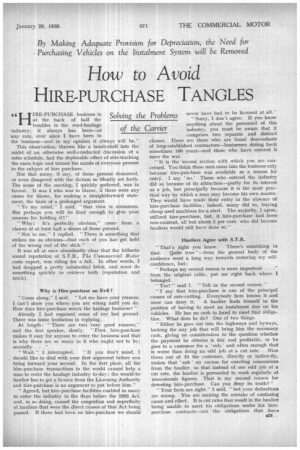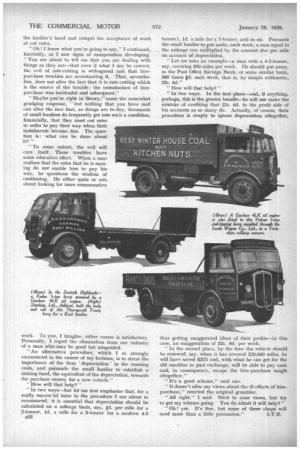By Making Adequate Provision for Depreciation, the Need for Purchasing Vehicles on the Instalment System will be Removed
Page 25

Page 26

If you've noticed an error in this article please click here to report it so we can fix it.
How to Avoid
HIRE-PURCHASE TANGLES
(, 4 IRE-PURCHASE business is
H
at the back of half the troubles in the road-haulage industry; it always has been—at anyrate, ever since I have been in the business—and in my opinion it always will be." This observation, thrown like a bomb-shell into the midst of an otherwise well-conducted discussion of a rates schedule, had the deplorable effect of side-tracking the main topic and turned the minds of everyone present to the subject of hire purchase. Not that many, if any, of those present demurred, or even disagreed with the dictum so bluntly set forth. The sense of the meeting, I quickly gathered, was in favour. It was I who was to blame, if there were any cause for blame, for making a straightforward statement, the basis of a prolonged argument.
" To my mind," I said, "that view is erroneous. But perhaps you will be kind enough to give your reasons for holding it?"
"Why! It's perfectly obvious," came from a chorus of at least half a dozen of those present.
"Not to me," I replied. "There is something that strikes me as obvious—that each of you has got hold of the wrong end of the stick."
It was all at once abundantly clear that the hitherto sound reputation of S.T.R., The Commercial Motor costs expert, was riding for a fall. In other words, I had dropped a pretty substantial brick, and must do something quickly to retrieve both (reputation and brick).
of th
Why is Hire-purchase an Evil ?
"Come along," I said. "Let me have your reasons. I can't show you where you are wrong until you do. How does hire-purchase wreck the haulage business? "
Already I had regained some of my lost ground. There was some hesitation in replying.
At length : "There are two very good reasons," said the first speaker, slowly. "First, hire-purchase makes it easy for anyone to enter the business and that is why there are so many in it who ought not to be ; secondly . . ."
"Wait," I interrupted. "If you don't mind, I should like to deal with your first argument before you bring forward your second. In the first place, all the hire-purchase transactions in the world cannot help a man to enter the haulage industry to-day ; the would-be haulier has to get a licence from the Licensing Authority and hire-purchase is no argument to put before him."
'' Agreed, but hire-purchase facilities enabled so many to enter the industry in the days before the 1933 Act, and, in so doing, caused the congestion and superfluity of hauliers that were the direct causes of that Act being passed. If there had been no hire-purchase we should never have had to be licensed at all."
"Sorry, I don't agree. If you know anything about the personnel of this industry, you must be aware that it comprises two separate and distinct classes. There are those who are lineal descendants of long-established contractors—businesses dating back sometimes 100 years--and those who have entered it since the war.
"It is the second section with which you are concerned. You think those men came into the business only because hire-purchase was available as a means for entry. I say no.' Those who entered the industry did so because of its attraction—partly for its interest as a job, but principally because it is the most practical way by which a man may become his own master. They would have made their entry in the absence of hire-purchase facilities ; indeed, many did so, buying cheap used machines for a start. The majority, I agree, utilized hire-purchase, but, if hire-purchase had been non-existent, all but about 5 per cent. who did become hauliers would still have done so."
Carrier
Hauliers Agree with S.T.R.
" That's right you know. There's something in that. Quite true "—from the general body of the audience went a long way towards restoring my selfconfidence, but : " Perhaps my second reason is more important . . ." from, the original critic, put me right back where I belonged.
" Yes? " said I. "Tell us the second reason."
" I say that hire-purchase is one of the principal causes of rate-cutting. Everybody here knows it and none can deny it. A haulier finds himself in the position of having to meet an instalment due on his vehicles. He has no cash in hand to meet that obligation. What does he do? One of two things.
"Either he goes out into the highways and byways, looking for any job that will bring him the necessary cash, giving no consideration to the question whether the payment he obtains is fair and profitable, or he goes to a customer for a 'sub,' and often enough that is worse than doing an odd job at a cut rate. Nine times out of 10 the customer, directly or indirectly, makes that ' sub ' an excuse for exacting concessions from the haulier, so that instead of one odd job at a cut rate, the haulier is persuaded to work regularly at uneconomic figures. That is my second reason for detesting hire-purchase. Can you deny its truth?"
" Your facts are right." I said, "but your deductions are wrong. You are making the mistake of confusing cause and effect. It is cut rates that result in the haulier being unable to meet his obligations under his hirepurchase contracts—not the obligations that force the haulier's hand and compel the acceptance of work at cut rates.
'Oh I know what you're going to say," I continued, hurriedly, as I saw signs of exasperation developing. " You are about to tell me that you are dealing with things as they are—that even if what I say be correct, the evil of rate-cutting is widespread and that hirepurchase troubles are accentuating it, That, nevertheless, does not alter the fact that it is rate-cutting which is the source of the trouble; the introduction of hirepurchase was incidental and subsequent."
" Maybe you're right in theory," came the somewhat grudging response, "but nothing that you have said can alter the fact that, as things are to-day, thousands of small hauliers do frequently get into such a condition, financially, that they must cut rates in order to pay their way when their instalments become due. The question is: what can be done about it? "
"To some extent, the evil will cure itself. These troubles have some educative effect. When a man realizes that the rates that he is earning do not enable him to pay his way, he questions the wisdom of continuing. He either quits or sets about looking for more remunerative work. To you, I imagine, either course is satisfactory. Personally, I regret the elimination from our industry of a man who may be good but misguided.
"An alternative procedure, which I so strongly recommend in the course of my lectures, is to stress the importance of the item 'depreciation' in the running costs, and persuade the small haulier to establish a sinking fund, the equivalent of the depreciation, towards the purchase money for a new vehicle."
"How will that help?"
" In two ways but let me first emphasize that, for a really succes: ail issue to the procedure I am about to recommend, it is essential that depreciation should be calculated on a mileage basis, say, d. per mile for a 2-tonner, Id. a mile for a 3-tonner (or a modern 4-5 u22 tonner), id. a mile for a 7-tonner, and so on. Persuade the small haulier to put aside, each week, a sum equal to the mileage run multiplied by the amount due per mile on account of depreciation.
"Let me take an example—a man with a 4-5-tonner, say, covering 360 miles per week. He should put away, in the Post Office Savings Bank, or some similar bank, 360 times Id. each week, that is, by simple arithmetic, 22s. 6d•-" "How will that help?"
"In two ways. In the first place—and, if anything, perhaps, this is the greater benefit—he will not make the mistake of crediting that 22s. 6d. to the profit side of his accounts as so many do. Actually, of course, their procedure is simply to ignore depreciation altogether, thus getting exaggerated ideas of their profits—in this case, an exaggeration of 22s. 6d. per week.
"In the second place, by the time the vehicle should be renewed, say, when it has covered 120,000 miles, he will have saved £375 and, with what he can get for the old machine in part exchange, will be able to pay cash and, in consequence, escape the hire-purchase tangle altogether."
"It's a good scheme," said one.
"It doesn't alter my views about the ill effects of hirepurchase," retorted the original grumbler.
"All right," I said. Stick to your views, but try to get my scheme going. You do admit it will help?"
"Oh! yes. It's fine, but some of these chaps will need more than a little persuasion."
































